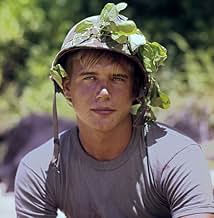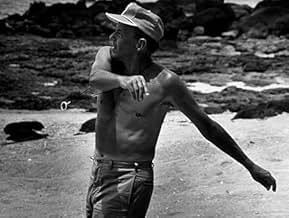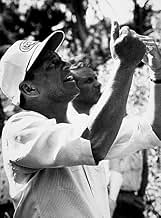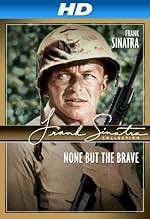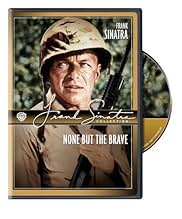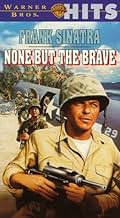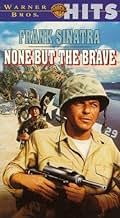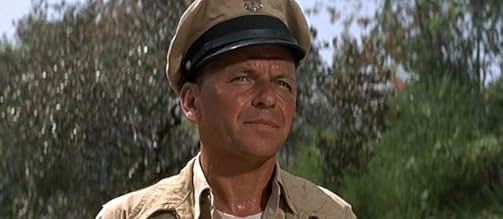IMDb RATING
6.4/10
2.2K
YOUR RATING
During WW2, a platoon of Marines crash-lands on a tiny Pacific island occupied by a small Japanese unit.During WW2, a platoon of Marines crash-lands on a tiny Pacific island occupied by a small Japanese unit.During WW2, a platoon of Marines crash-lands on a tiny Pacific island occupied by a small Japanese unit.
- Director
- Writers
- Stars
Takeshi Katô
- Sgt. Tamura
- (as Takeshi Kato)
Tôru Ibuki
- Pvt. Arikawa
- (as Toru Ibuki)
Ryûchô Shumpûtei
- Pvt. Okuda
- (as Ryucho Shunputei)
- Director
- Writers
- All cast & crew
- Production, box office & more at IMDbPro
Featured reviews
Can circumstances turn bitter enemies fighting for their countries into true friends? None But the Brave attempts to answer this question with a unique look at the relationship between two companies of enemy soldiers during World War II. This 1965 film is a character study of the two groups one American, the other Japanese. Marooned together on an island, they are forced into a reluctant cease-fire in order to help each other survive.
Frank Sinatra plays Chief Pharmacist Maloney, an alcoholic medic. As always, `Ol' Blue Eyes' shines with his great performance, proving how incredibly underrated he is as an actor. His co-stars are Tatsuya Mihashi as Lieutenant Kuroki and Clint Walker as Captain Bourke. The poignant story is told from the perspective of Kuroki, the ranking Japanese soldier. Mihashi performs brilliantly as a man driven to honor his country, but in his heart carries deep hatred for violence and `admires men's works. not their destruction.' Walker's portrayal as Bourke, an American soldier haunted by his past, is outstanding. Kuroki and Bourke's positions are paralleled throughout the film as they struggle to keep their men under control in the middle of nowhere.
Sinatra was more than one of the film's stars. In a bit of multitasking, he also produced and displayed his directing skills in his only directorial endeavor. It is very apparent that the filmmakers tried extremely hard to display fair portrayals of both sides. For instance, there were three writers, Kikumaru Okuda and Katsuya Susaki, both Japanese, and John Twist, an American.
It was surprising that John Williams, credited as Johnny Williams, composed the musical score for this film. This was a rare opportunity to see just how much is skills have evolved since 1965, which of course is to be expected. While the music was entertaining, it did not reach the caliber of most of his soundtracks from around 1974 and up.
This was an excellent motion picture. It gets all points for writing and acting. The directing was quite good. My only criticism is that some of the action scenes could have been more dynamic. Sinatra apparently decided to use a very straightforward approach with the camerawork. This resulted in somewhat stagnant feel to the battle scenes where a slightly different angle would have made all the difference. This may have been on purpose, as this was not a typical shoot 'em up, drag 'em out war film, but had a much more intelligent story.
7 out of 10
Frank Sinatra plays Chief Pharmacist Maloney, an alcoholic medic. As always, `Ol' Blue Eyes' shines with his great performance, proving how incredibly underrated he is as an actor. His co-stars are Tatsuya Mihashi as Lieutenant Kuroki and Clint Walker as Captain Bourke. The poignant story is told from the perspective of Kuroki, the ranking Japanese soldier. Mihashi performs brilliantly as a man driven to honor his country, but in his heart carries deep hatred for violence and `admires men's works. not their destruction.' Walker's portrayal as Bourke, an American soldier haunted by his past, is outstanding. Kuroki and Bourke's positions are paralleled throughout the film as they struggle to keep their men under control in the middle of nowhere.
Sinatra was more than one of the film's stars. In a bit of multitasking, he also produced and displayed his directing skills in his only directorial endeavor. It is very apparent that the filmmakers tried extremely hard to display fair portrayals of both sides. For instance, there were three writers, Kikumaru Okuda and Katsuya Susaki, both Japanese, and John Twist, an American.
It was surprising that John Williams, credited as Johnny Williams, composed the musical score for this film. This was a rare opportunity to see just how much is skills have evolved since 1965, which of course is to be expected. While the music was entertaining, it did not reach the caliber of most of his soundtracks from around 1974 and up.
This was an excellent motion picture. It gets all points for writing and acting. The directing was quite good. My only criticism is that some of the action scenes could have been more dynamic. Sinatra apparently decided to use a very straightforward approach with the camerawork. This resulted in somewhat stagnant feel to the battle scenes where a slightly different angle would have made all the difference. This may have been on purpose, as this was not a typical shoot 'em up, drag 'em out war film, but had a much more intelligent story.
7 out of 10
In the midst of WWII, a pair of American transport planes (each full of Marines) is shot down. One (piloted by Walker) manages to crash land on a nearby uncharted island which happens to be inhabited by a small contingent of Japanese soldiers. Directed by Sinatra (in his one and only try), the film demonstrates the parallels and differences between these small units of soldiers on opposing sides and with varying backgrounds. Much of the film is devoted to the Japanese point of view as they are led by Mihashi (and most of it is presented in their native tongue with subtitles.) The rest concerns Walker, who takes charge of the remaining men, Sinatra, a boozy medic, Sands, a hopelessly eager upstart and Dexter, a grizzled Sergeant. Hostility between the enemies finally gives way to a sort of truce, or at least a cease-fire, until finally the men must live up to their country's expectations of eliminating each other. There's a lot of good in the film. It was an early example of showing more than one perspective with regards to enemies of America and it demonstrates, at times rather well, the ultimate futility and wastefulness of war. However, Sinatra, as a director, is in a bit over his head and the film is often static or choppy in it's narrative. There are also a ridiculous amount of scenes in which characters stay alive simply because either the enemy stops shooting (for no reason) or else misses by a mile. A lot of this could have been rectified in the staging of the battle sequences. Sinatra's role in the film is actually a supporting one, mostly consisting of one queasy, unbearably nerve-tingling sequence in which he is traded to the Japanese in order to perform surgery on one of their men. Otherwise, he is just onhand to provide the occasional snarky remark. Walker is a tower of virility and quiet strength. NO ONE wore a helmet like him or filled out their fatigues with more monument-like beauty. His enthralling baritone voice and piercing, ice-blue eyes make sitting through this film a little more enjoyable than it could have been without him. Sands is so unintentionally hilarious and so jaw-droppingly bad that his scenes ascend into some crazed, parodic comic stratosphere! WHAT was he thinking? It's like some teenage punk decided to portray a soldier the way he always dreamed of when in his sandbox as a child. His jaw, his posture, his accent.....all combine to create a memorably uproarious caricature. Dexter (the always-forgotten member of "The Magnificent Seven") has a couple of decent moments, notably in a conflict with Walker. Other soldiers are portrayed by healthy-looking, earnest actors who fit their roles well, though most of them don't get a chance to really shine. There are two very brief flashbacks by Mihashi and Walker that present the lady loves of their lives. Walker's is played (with hair and make-up that are about as 1940's as Sharon Tate in "Valley of the Dolls"!) by Stephens in her film debut. Though uneven, the film succeeds in presenting the enemy as human and in promoting the power of goodwill. The fact that Walker, in every frame, is breathtakingly handsome is gravy. (Oddly, he is pictured NOWHERE on the video box even though he is actually the leading man of the film!)
The title is from John Dryden's poem, "Alexander's Feast", stanza 1: "None but the brave/ deserve the fair" . Sinatra's directorial debut , it results to be an efficient effort , a straightforward and gripping movie , being the first Japanese/American co-production . During WWII , an American bomber aircraft is gunned down and crashes on an island (the plane flown that was shot down was R4D, C47 transport) . American and marooned Japanese soldiers (survivors from a Japanese battalion) are stranded on a tiny Pacific island , in the Salomons , during World War II . But in this uninhabited island in the Pacific Ocean there is one Japanese military group and both of them stranded together . There takes place a physical and psychological battle between American/Japanese with anti-war allegory . After a skirmish , the two bunches initiate a fragile truce with the understanding that fighting will resume if one or the other sends for help . The Japanse detachment (who are mercifully allowed to speak Japanese) is commanded Lt. Kuroki (Tatsuya Mihashi) , as the film being told through the eyes of this Japanese unit commander . The American group is commanded by Capt. Dennis Bourke (Clint Walker) who must deal with an atmosphere of growing distrust and tension between their men . They confront each other in a violent mini-war but then come to terms with each other . . There , they must cease their hostility and unite themselves if they want to survive until a disappointing and unexpected ending . The Marines hold heavy weapons : M1 , Grease gun , carbine and 45 cal pistol against the Japanese rifle and hand grenade . Soonafter , the American attempt to capture a boat laboriously built by the Japanese . The American repair their radio unit ; then , things go wrong and they must decide on their next unsettling actions . This movie's closing end coda states: "Nobody Ever Wins" .
Nice and well executed film set during WWII , containing a brief anti-war declaration . The plot is plain as well as simple and prefigures ¨John Boorman's Hell in Pacific¨ , dealing with a platoon of Marines crash-lands on a tiny Pacific island occupied by a small Japanese unit and must make a temporary truce and cooperate to survive various tribulations . The film has a carefully constructed mood as the two groups warily circle each other and spasmodically clashing in battle , including an anti-war message ingeniously overplayed . However , being stupidly fractured by two inappropriate flashbacks , obviously designed to provide the ordinary love interest . The movie sometimes lapses into tedium and slowness , though contains striking images with moments of great power and adequate scenarios . Here Sinatra gives a very good acting as the sympathetic but drunk doctor . Known as "One-Take Charlie" for his approach to acting that strove for spontaneity and energy, rather than perfection , Sinatra was an instinctive actor who was best at playing parts that mirrored his own personality . The remaining cast is pretty good , such as : the tall Clint Walker who bears the main role , Brad Dexter from Magnificent seven , Tony Bill , Rafer Johnson as Pvt. Johnson , Tommy Sands who co-stars in the movie divorced Nancy Sinatra, Frank Sinatra's daughter , the same year this picture came out and Richard Sinatra , Frank Sinatra's cousin, appears as Private Roth . And special mention for Tatsuya Mihashi as Lt. Kuroki .
This is the first Japanese-American co-production, produced by Kikumaru Okuda for Toho Studios and by Frank Sinatra for Warner Brothers , being professionally directed by Frank who displays great competence as an action filmmaker with some scenes that are decently choreographed and memorable fight shots of both sides when they destroy their means of getaway . Frank Sinatra's only film as director and his 6th out of nine films as producer , though he also made 2 episodes ,¨The Frank Sinatra Show¨ TV Series . Sinatra's biggest hit was his role as Maggio in From Here to eternity (1953) . He won an Oscar for best supporting actor and followed this with a scintillating performance as a cold-blooded assassin hired to kill the US President in Suddenly (1954). Arguably a career-best performance , garnering him an Academy Award nomination for Best Actor , was his role as a pathetic heroin addict in the powerful drama The man with the Golden arm (1955). He continued to give strong and memorable performances in such films as Guys and dolls (1955) and Some come running (1958). In the late 1950s and 1960s Sinatra became somewhat prolific as a producer, turning out such films as A hole in the head (1959) , Sergeant 3 (1962) and the very successful Robin and 7 Hoods (1964). Lighter roles alongside "Rat Pack" buddies Dean Martin and Sammy Davis Jr. were lucrative, especially the famed Ocean's eleven (1960). On the other hand, he alternated such projects with much more serious offerings, such as The Manchurian Candidate (1962), regarded by many critics as Sinatra's finest picture . That same year Von Ryan (1965) was a box office sensation . In 1967 Sinatra returned to familiar territory in Sidney J. Furie's The naked runner (1967) , once again playing masterfully in his only film to be shot in the U.K. and Germany . That same year he starred as a private investigator in Tony Rome (1967), a role he reprised in the sequel , Lady in cement (1968). He also starred with Lee Remick in The detective (1968), a film daring for its time with its engaging theme and it was a major box-office success.
Nice and well executed film set during WWII , containing a brief anti-war declaration . The plot is plain as well as simple and prefigures ¨John Boorman's Hell in Pacific¨ , dealing with a platoon of Marines crash-lands on a tiny Pacific island occupied by a small Japanese unit and must make a temporary truce and cooperate to survive various tribulations . The film has a carefully constructed mood as the two groups warily circle each other and spasmodically clashing in battle , including an anti-war message ingeniously overplayed . However , being stupidly fractured by two inappropriate flashbacks , obviously designed to provide the ordinary love interest . The movie sometimes lapses into tedium and slowness , though contains striking images with moments of great power and adequate scenarios . Here Sinatra gives a very good acting as the sympathetic but drunk doctor . Known as "One-Take Charlie" for his approach to acting that strove for spontaneity and energy, rather than perfection , Sinatra was an instinctive actor who was best at playing parts that mirrored his own personality . The remaining cast is pretty good , such as : the tall Clint Walker who bears the main role , Brad Dexter from Magnificent seven , Tony Bill , Rafer Johnson as Pvt. Johnson , Tommy Sands who co-stars in the movie divorced Nancy Sinatra, Frank Sinatra's daughter , the same year this picture came out and Richard Sinatra , Frank Sinatra's cousin, appears as Private Roth . And special mention for Tatsuya Mihashi as Lt. Kuroki .
This is the first Japanese-American co-production, produced by Kikumaru Okuda for Toho Studios and by Frank Sinatra for Warner Brothers , being professionally directed by Frank who displays great competence as an action filmmaker with some scenes that are decently choreographed and memorable fight shots of both sides when they destroy their means of getaway . Frank Sinatra's only film as director and his 6th out of nine films as producer , though he also made 2 episodes ,¨The Frank Sinatra Show¨ TV Series . Sinatra's biggest hit was his role as Maggio in From Here to eternity (1953) . He won an Oscar for best supporting actor and followed this with a scintillating performance as a cold-blooded assassin hired to kill the US President in Suddenly (1954). Arguably a career-best performance , garnering him an Academy Award nomination for Best Actor , was his role as a pathetic heroin addict in the powerful drama The man with the Golden arm (1955). He continued to give strong and memorable performances in such films as Guys and dolls (1955) and Some come running (1958). In the late 1950s and 1960s Sinatra became somewhat prolific as a producer, turning out such films as A hole in the head (1959) , Sergeant 3 (1962) and the very successful Robin and 7 Hoods (1964). Lighter roles alongside "Rat Pack" buddies Dean Martin and Sammy Davis Jr. were lucrative, especially the famed Ocean's eleven (1960). On the other hand, he alternated such projects with much more serious offerings, such as The Manchurian Candidate (1962), regarded by many critics as Sinatra's finest picture . That same year Von Ryan (1965) was a box office sensation . In 1967 Sinatra returned to familiar territory in Sidney J. Furie's The naked runner (1967) , once again playing masterfully in his only film to be shot in the U.K. and Germany . That same year he starred as a private investigator in Tony Rome (1967), a role he reprised in the sequel , Lady in cement (1968). He also starred with Lee Remick in The detective (1968), a film daring for its time with its engaging theme and it was a major box-office success.
an old idea done better in many other movies, i.e opposing sides find themselves in the same boat and fight and wonder why; odd part if the several misplaced performances; start with sinatra doing the typical club singer vegas performance except in uniform in the south pacific; follow that with the most bizarre- tommy sands, then a teen idol singer (oh, and sinatra's son in law) who was a little person with a little voice somehow not realizing what a fool he was acting by pretending to be a big tough marine booming out orders; it's just laughable; anyway, the best version of this is lee marvin in hell in the pacific; still a war movie but thoughtful, interestingly shot
Like its better known cousin HELL IN THE PACIFIC, NONE BUT THE BRAVE is a story about US and Japanese troops stranded on a desert island during WW2. It's a tense and highly watchable tale that makes Frank Sinatra's sole directorial credit, and he also co-stars in the movie as the medic of the group.
The tale is quite low key and more of a character piece than an action film. There are action scenes here, but they're few and far between and low budget. Nonetheless the film looks classy and expensive with fine cinematography that brings the lush locations to life. As an anti-war piece of filmmaking, it ploughs much the same furrow as HELL IN THE PACIFIC, exploring the way in which all soldiers are the same and the parallels between the two units despite their utmost grievances.
There are some exemplary performances amid the cast members. Clint Walker is exceptional as the nominal group leader and Tatsuya Mihashi his equal as his Japanese rival. Sinatra himself gives an understated performance but the set-piece involving the amputation is the tensest and best in the whole film, a minor acting masterclass from the star. Only Tommy Sands falls apart with a turn that could best be described as a caricature of a real person.
The tale is quite low key and more of a character piece than an action film. There are action scenes here, but they're few and far between and low budget. Nonetheless the film looks classy and expensive with fine cinematography that brings the lush locations to life. As an anti-war piece of filmmaking, it ploughs much the same furrow as HELL IN THE PACIFIC, exploring the way in which all soldiers are the same and the parallels between the two units despite their utmost grievances.
There are some exemplary performances amid the cast members. Clint Walker is exceptional as the nominal group leader and Tatsuya Mihashi his equal as his Japanese rival. Sinatra himself gives an understated performance but the set-piece involving the amputation is the tensest and best in the whole film, a minor acting masterclass from the star. Only Tommy Sands falls apart with a turn that could best be described as a caricature of a real person.
Did you know
- TriviaDuring downtime whilst shooting the picture, Brad Dexter saved Frank Sinatra from drowning when he dived into the ocean and rescued the floundering singer.
- GoofsOne African American belongs to the USMC platoon. At this time, US military was not an integrated military and Blacks were segregated. This black Marine couldn't have been a member of this platoon. The USMC was integrated in World War II, as according to the Marine hierarchy, "There is only one color in the USMC, Marine Corps green."
- Quotes
Lt. Kuroki: Our island is a little chunk of coral in the Sakhalin archipelago. It is nameless and the Great War beyond its horizons ignores us, for we are the expendables of an amphibious landing, left to God, a forgotten outpost of the Imperial Japanese Army.
- Crazy creditsThe line NOBODY EVER WINS appears in place of "The End" just before the end credits start, which is appropriate given the film's anti-war message.
- Alternate versionsSome prints of the film do not include subtitles for any of the Japanese sequences.
- ConnectionsFeatured in Stars of the Silver Screen: Frank Sinatra (2011)
Details
- Runtime
- 1h 46m(106 min)
- Aspect ratio
- 2.35 : 1
Contribute to this page
Suggest an edit or add missing content



